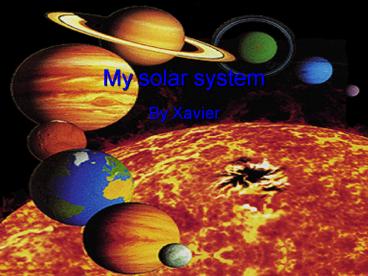My solar system
1 / 11
Title: My solar system
1
My solar system
- By Xavier
2
Table of contents
- Mercury
- Venus
- Earth
- Mars
- Jupiter
- Saturn
- Uranus
- Neptune
- Pluto
3
Mercury
- Mercury is the close's planet to the sun it was
formed by a collision between mercury and a
little tiny rock. This event happened early in
the history of the planets, as the floor the
basin has been scared by many more recent
impacts. And Mercury has no moons.
This picture was taken by www.bbc.com
http//www.bbc.co.uk/science/space/solarsystem/plu
http//
4
VENUS
- Venus is the second planet from the sun. And if
you can stand the hostile conditions on this
planets surface the mean crater is big by
Venusian's standards-a breathtaking 280km
across. And Venus has no moons.
This picture was taken by www.bbc.com
http//www.bbc.co.uk/science/space/solarsystem/plu
to/index.shtml
5
EARTH
- Earth is the 3rd planet from the sun and Earth
has one moon. However, at nearly 6400km long, the
great walls remains the largest artificial on
the planet. Its often said the great wall of
China is the only artificial object visible from
space.
This picture was taken by ww.bbc.com
http//www.bbc.co.uk/science/space/solarsystem/plu
to/index.shtml
6
MARS
- Mars is the forth planet from the sun. Mars has
some of the most spectacular scenery in the solar
system. A giant canyon system stretching over
5,000km 3,100 miles along the equator with an
average depth of six km. And it has the largest
volcano on the planet and mars has 2 moons.
This picture was taken by www.bbc.com
http//www.bbc.co.uk/science/space/solarsystem/
7
JUPITER
- Jupiter is the 5th planet from the sun. Jupiter
is the fourth giant planet in the solar system.
Jupiter has 39moons thats a lot. Jupiter is one
of the four gas giant planets. Unlike rocky
worlds like the Earth, Jupiter is composed almost
entirely of gas. Inside the swirling ball of gas
lies a small core of solid rock.
This picture was taken by www.bbc.com
http//www.bbc.co.uk/science/space/solarsystem/
8
SATURN
- Saturn is the 6th planet from the sun. And Saturn
has 25moons thats a lot of moons. And Saturn is
the gas giant planet, like its larger neighbor
Jupiter. Although its not as bright colored as
Jupiter, the planets have very similar
composition. Saturn has the most spectacular
rings in the solar system.
This picture was taken by WWW.bbc.com
http//www.bbc.co.uk/science/space/solarsystem/
9
URANUS
- Uranus is the 7th planet in the solar system and
it has 25moons that is a lot. Like nearby
Saturn, Jupiter, and Neptune, Uranus is a planet
made almost entirely of gas. The atmosphere is
mostly hydrogen and helium, with small quantities
of methane.
This picture was taken by WWW.bbc.com
http//www.bbc.co.uk/science/space/solarsystem/
10
NEPTUNE
- Neptune is the 8th planet from the sun and it has
11moons thats not a lot. Neptune is one of the
four gas giant in the solar system and also
along with Saturn, and Uranus. They are planets
composed almost entirely of gas. Neptune vivid
blue color is a mystery. No one knows the
identity of the light-absorbing chemical that
creates its deep blue skies.
This picture was taken by www.bbc.com
http//www.bbc.co.uk/science/space/solarsystem/
11
Pluto
- Pluto is the 9th planet from the sun and it only
has 1 moon. Pluto is the farthest planet form the
sun. Except for 20years during its 248 obit, when
it comes farther away from the sun surface of
Pluto, the sun is so small it looks like a bright
star in sky. than Neptune. From the
This picture was taken by www.bbc.com
http//www.bbc.co.uk/science/space/solarsystem/plu
to/index.shtml































